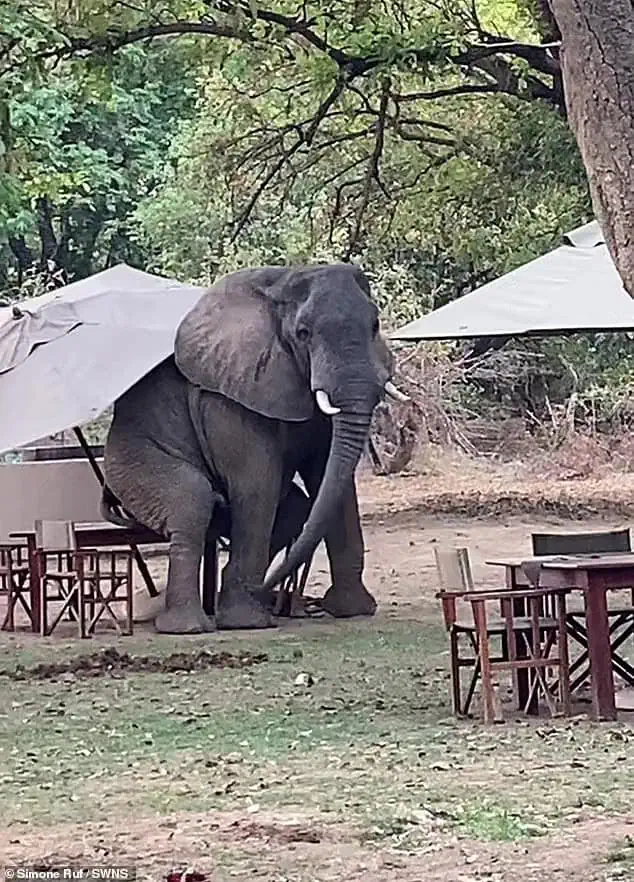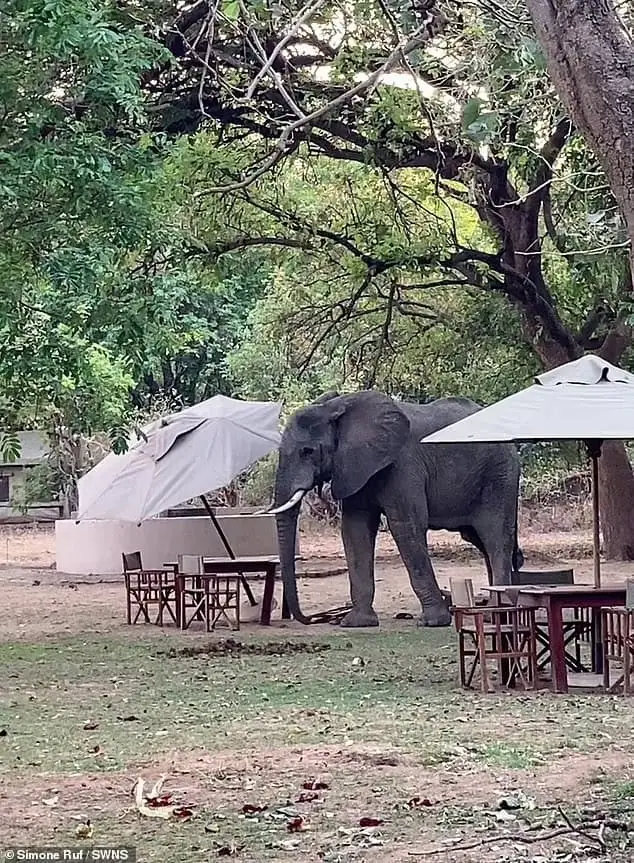It was a morning like any other at Flatdogs Camp, perched on the edge of the wild and beautiful South Luangwa National Park in Zambia. The sun was climbing, birds called overhead, and guests enjoyed breakfast in the open café beside the lodge. The air was peaceful, as is often the case in places so close to nature.

Then, in a moment, that calm shifted.
From the direction of the bush, something huge appeared. A massive male elephant, weighing perhaps three tons, walked deliberately toward the café. He wasn’t charging or trumpeting — he seemed simply curious.
People paused. Conversations died away. The elephant’s ears flapped slightly, his trunk swayed, and his steps were measured. He came to the edge of the patio and looked around — at the chairs, tables, umbrellas. Everyone held their breath.
Then came the surprising part.

The elephant nudged an umbrella gently aside, sniffed a table, and — in a gesture that startled everyone — began to lower his body onto the table. The wooden structure groaned. One umbrella spoke bent. And there he sat, as if waiting for a cup of coffee to arrive.
It was bizarre. It was magical. It was a moment where a wild animal — in all its size and power — acted with a playful, mischievous curiosity.
One of the witnesses, Simone Ruf (who works at Flatdogs), captured the scene. “First the elephant bull moved the umbrella around, then he decided to sit on the table,” she said. “It looked like he wanted to use the table as a seat. I think he was mostly just being naughty.”
Moments later, as spontaneously as he had arrived, the elephant rose, the table buckled, and he snapped one umbrella spoke on his way out. Then he ambled back into the bush, leaving an astonished audience behind.
“It’s moments like these that remind you whose home this really is,” Simone reflected. “The animals are the true locals.”
The Place: Flatdogs Camp & South Luangwa
To understand how something like this could even happen, we need a little background on the place.
Flatdogs Camp is a safari lodge situated near the entrance to South Luangwa National Park.
The camp offers a mix of safari tents, chalets, and even a Jackalberry Tree House, blending comfort with immersion in the wild.
What makes Flatdogs unique is its proximity to wild lands and its integration with nature. Because there are no fences around parts of the surrounding Game Management Areas (GMAs), animals — from antelope to elephants — move freely near the lodge.
Camps like Flatdogs are not sealed off from wildlife; rather, they often share the space.
South Luangwa is famed for its richness in wildlife — elephants, giraffes, lions, leopards, buffalo, and many more roam in this vast wilderness.
For visitors, it offers classic safari experiences: morning and night game drives, walking safaris, and close-up encounters with nature.
So when an elephant wanders toward a lodge, it’s not always a dangerous act — sometimes it’s just curiosity. But few guests have ever seen one treat a café table like a throne.
Why This Story Captured Hearts
This scene wasn’t just amusing — it struck a chord because it showed how wildness and humanity can meet in a soft, surprising way.
Unexpected behavior: Usually, wild animals keep their distance from human structures. Here, the elephant approached and interacted — gently and playfully — with our furniture.
No aggression: There was no threat, no panic. The elephant acted like a cat deciding whether a chair was comfy.
Moment of connection: For a few minutes, humans and a wild giant shared the same space, each watching the other.
Reminder of who belongs: As Simone said, “We’re just the guests.” The animals are the real residents of the land.
The images and story went viral online. News outlets like People covered it, showcasing photos of the elephant sitting on the cafe table, and sharing Simone’s account.
People.com
Lessons from the Wild
What can we take away from this odd little episode?
Respect and humility
Even in a managed camp, nature has its own rules. Our comforts — tables, chairs, umbrellas — are trivial in the eyes of the wild.
Boundaries matter
Lodges in wildlife areas must design carefully. Furniture must be sturdy, spaces flexible, and safety considered (without removing the
Wildlife is alive and curious
Animals don’t live to behave like animals in a zoo. They explore, test boundaries, and show personalities. Sometimes they’re mischievous.
